Bearded Collie (original) (raw)
The bearded collie is known to make a great family and show dogs and is also a great sheepdog.
Bred in Scotland to herd sheep and cattle, the Bearded Collie is a purebred dog that is trained to herd cattle in any weather or terrain.
Despite being purebred dogs, bearded collies can be found in shelter homes and/or rescue centers. These dogs are extremely energetic and participate in different kinds of dog sports like rallies or agility.
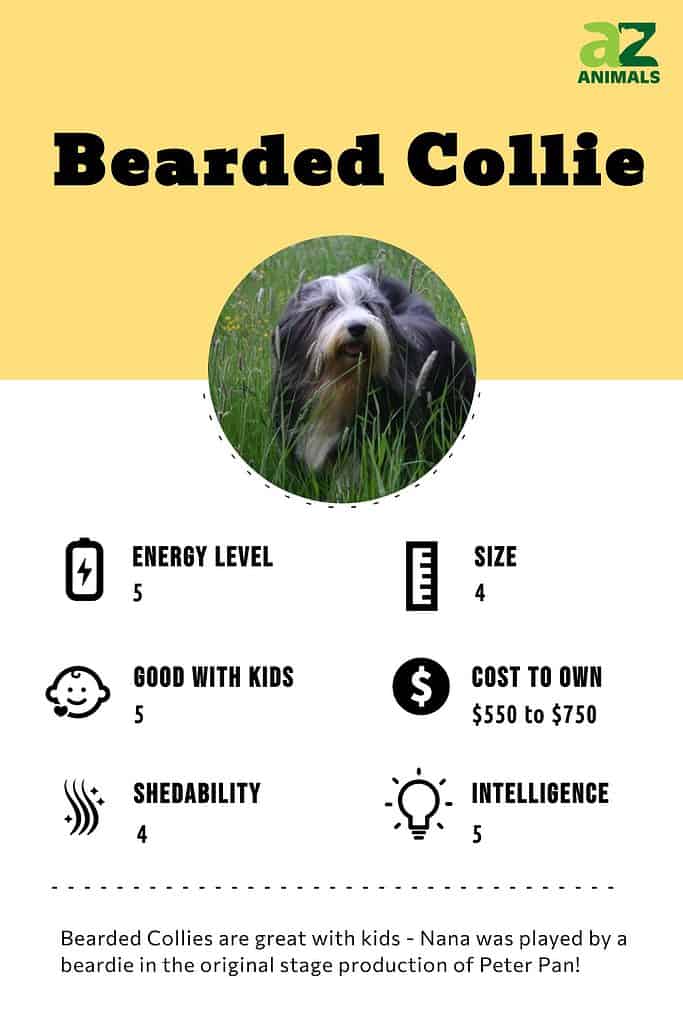
Evolution
Shaggy-haired herding dogs have been working in Scotland for so long that it is difficult to pinpoint exactly when the beardie came to be. Most believe the dogs to be the result of the breeding of Polish Sheepdogs with Scottish herding dogs as early as 1514.
Three Pros and Cons of Owning a Bearded Collie
If you are looking to own a bearded collie, here are some things to keep in mind.
| Pros! | Cons! |
|---|---|
| IntelligentBearded collies are known to be intelligent dogs and are often used for watchdog purposes due to their vigilant nature. | High maintenanceBearded collies are high-maintenance and are often difficult to groom. You would need to do a lot of work on the dog to keep it in a decent condition. |
| AdaptableBearded collies are also very adaptable and can easily adjust to new environments – making them a desirable pet option. | Excessive sheddingThese dogs are known to shed a lot which oftentimes becomes a tedious task to clean after for the dog owner. |
| Easy to trainBearded collies are easy to train and are known to pick up commands faster, which is another desirable characteristic for this dog breed. | A great demand for social interactionBearded collies demand a great deal of company. They can often feel lost and have behavior issues if left alone for a long time. |
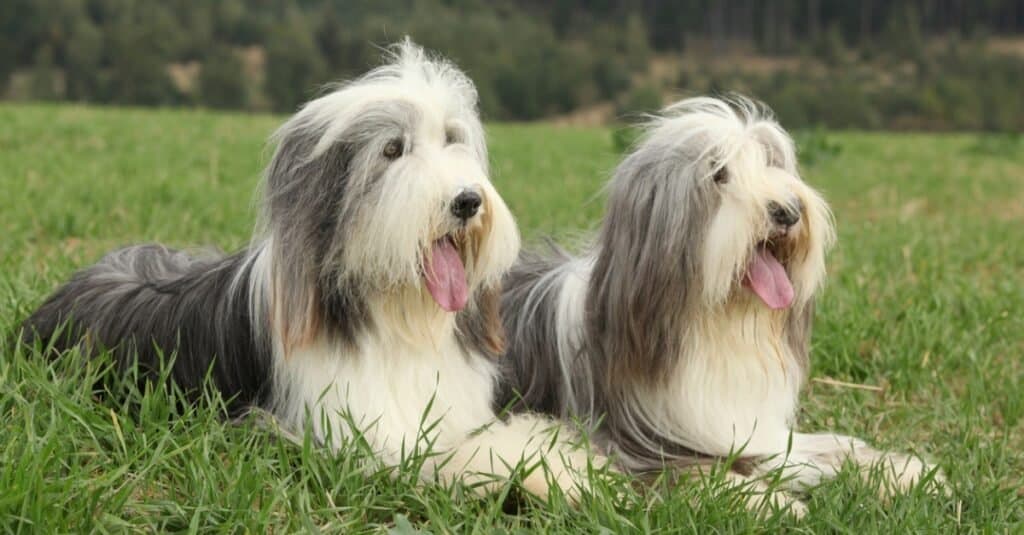
Bearded collies come in several colors with eyes that match their coats.
©iStock.com/Zuzule
Size and Weight
The breeding of the bearded collie in Scotland has led the breed to reach a medium size with a rectangular body shape. The bearded collie has a shaggy coat that comes in different colors like fawn, blue, brown, and black. Sometimes, the fur also has some white markings. These dogs have the same eye color as their coats.
| Male | Female | |
|---|---|---|
| Height | 20 to 22 inches | 20 to 20.8 inches |
| Weight | 87.3 to 131.2 lb | 87.3 to 131.2 lb |
Common Health Issues
Much like other animals, the bearded collie suffers from some health complications – including hip dysplasia, which is the abnormal formation of the hip bone. They can suffer from this same developmental issue in the elbow bone as well.
Beardies are prone to eye diseases as well, like progressive retinal atrophy (PRA). While this heritable condition is not painful, it eventually causes the dog to go blind and is incurable. In fact, bearded collies are more likely to see this genetic decline than most other breeds.
Autoimmune hypothyroidism is another major risk to a beardie, affecting the thyroid gland. The condition prevents the body from creating the hormones that this gland ordinarily would, leading to behavior changes (i.e. aggression or fearfulness), weight gain, and hair loss.
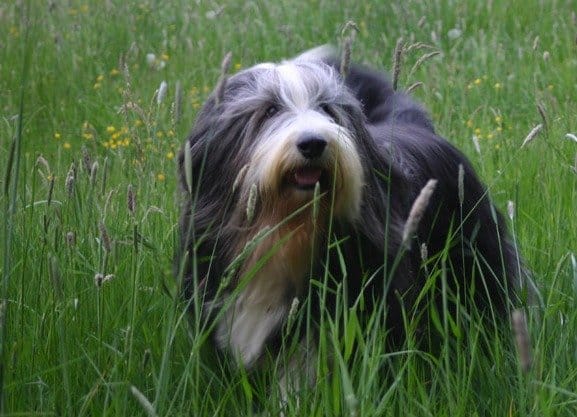
Bearded collies are prone to eye problems.
©Balbriggan, CC BY 3.0, via Wikimedia Commons – Original / License
The adrenal glands can also have problems, leading to a condition known as Addison’s disease. The endocrine disorder can lead to a lack of appetite, depression, weakness, and sometimes increased water intake. Most often, this condition will occur as the immune system attacks the adrenal glands, which are supposed to release cortisol to calm the dog during stress.
Therefore, some of the health issues that these dogs suffer from include:
- Hip dysplasia
- Elbow dysplasia
- Progressive retinal atrophy
- Addison’s disease
- Autoimmune hypothyroidism
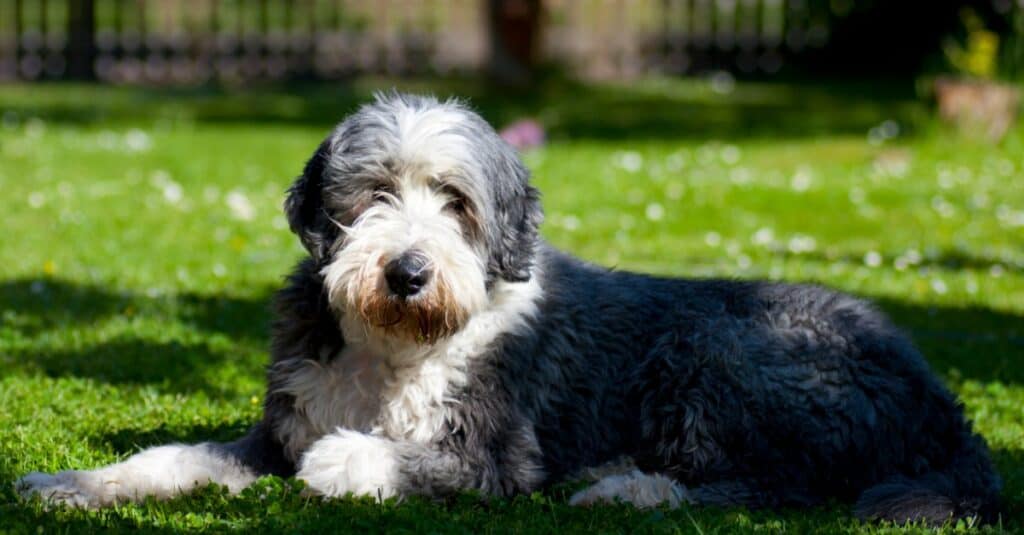
The bearded collie is a type of cattle dog that has a heavy coat developed to adapt to unpredictable weather.
©iStock.com/Pontuse
Temperament
These dogs are witty and very lively. Bearded collies are smart and active dogs. However, they can be very stubborn and independent.
They are extremely athletic and intelligent and are very easy to train. These dogs are usually friendly with other dogs and are known to be very hard-working. Beardies also enjoy competing with other dogs in various dog sports.
However, because these dogs are very active, they need a fair amount of exercise every day, the lack of which can cause bad behavioral issues in these dogs. Such issues can also occur in these dogs due to a lack of attention.
They are usually great with children. However, sometimes, these dogs can be too active for young kids.
How to Take Care of Bearded Collies
Here are a few things to consider concerning care for the bearded collie:
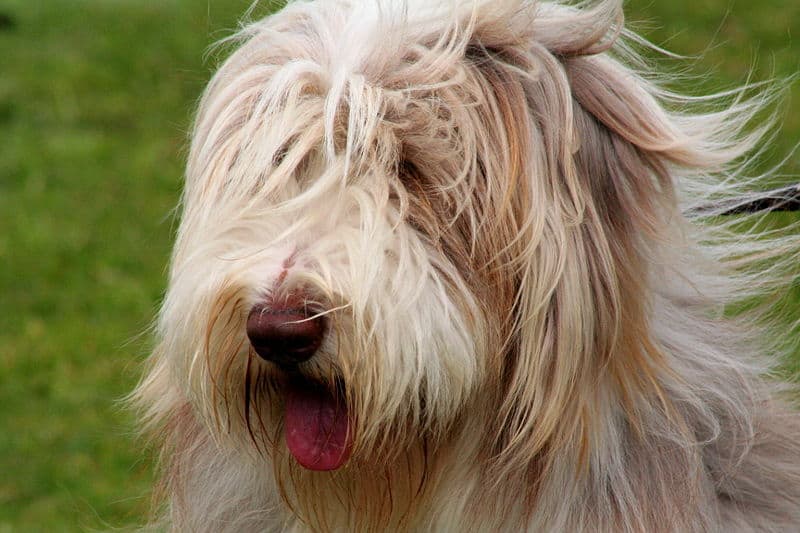
Bearded collies require a lot of grooming.
©John Haslam / CC BY 2.0, Flickr – Original / License
The Best Dog Food for Bearded Collies
The usual diet of the bearded collie includes meat, quinoa, shrimp, eggs, bread, and salmon. It is best that you feed your bearded collie about 1.5 to 2 cups of high-quality dog food per day. The quantity, however, can be split into two meals.
However, how much your bearded collie eats also depends on its age, size, and physical capabilities. Bearded Collie puppies usually eat three to four times a day in comparison to adult ones as they can’t digest a lot of food in one go.
Some foods are very harmful to your beaded collie, which include chocolates, raisins, grapes, garlic, and onions. You should avoid feeding these to your dog.
Many owners of dogs prone to adrenal/endocrine disorders have better results from organic dog food.
At A-Z Animals, we believe the best dog food for Bearded Collies is Purina ONE SmartBlend True Instinct Natural High Protein Adult Dry Dog Food.
Though not quite organic, this wholesome natural food is free from fillers, with no artificial flavors or preservatives. Instead, there’s 100% balanced nutrition, including 32% protein from real beef and salmon. Natural meat is a fantastic source of glucosamine for joints that can keep up with your Bearded Collie for life.
Check Chewy or Amazon for this product.
[lasso id=”419697″ link_id=”1756670″ ref=”purina-one-natural-high-protein-true-instinct-with-real-beef-salmon-dry-dog-food”]
Maintenance and Grooming
Bearded collies are high-maintenance dogs which means that these dogs require a lot of grooming and maintenance. This need arises especially due to its long coat hair which makes grooming a costly task.
The fur often collects a lot of dirt which must be removed with a hairbrush. It has been said that brushing a bearded collie’s fur could take up to an hour sometimes and that it takes at least three sessions a week. These dogs also have high shedding capabilities.
Bearded collies should get baths every 6 to 8 weeks with dog shampoo. Dog shampoos are available at many pet shops.
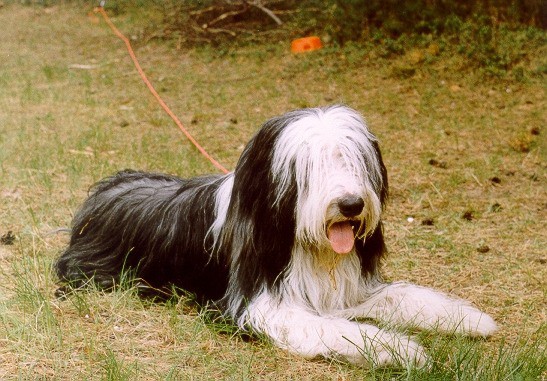
Bearded collies are easy to train and are quick to pick up commands.
©ja, CC BY-SA 3.0, via Wikimedia Commons – Original / License
Training
Since these dogs are physically very active, it is often easy to train them. They work best with human company and often help humans herd sheep. Bearded collies can quickly pick up commands. However, they do require proper training and attention.
These dogs, however, can be shy and therefore need to interact socially early on in their life. To start training your bearded collie puppy, you should first set a particular time and place and let the puppy get familiar with it.
After the connection builds, you can start introducing simpler training commands before shifting to more complex ones over time so that the dog can easily pick them up.
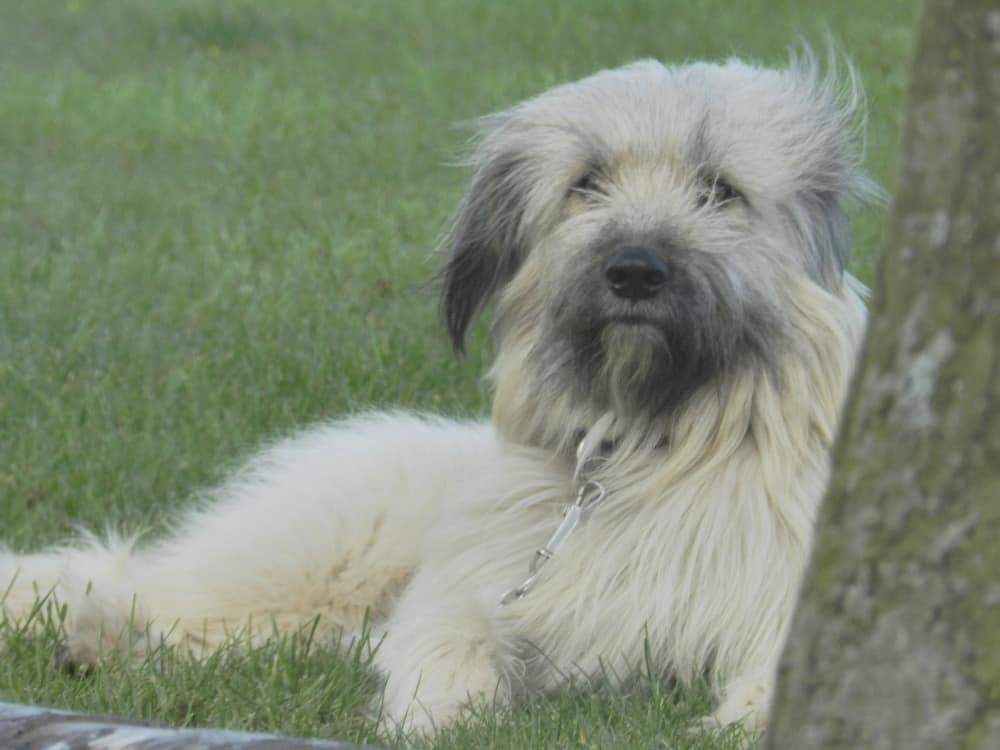
Bearded collies love to play and make great family pets.
©Millie Bond – Copyright A-Z Animals
Exercise
These dogs have high energy levels and usually need about one to two hours of daily exercise. Bearded collies are active dogs and often enjoy playing games. They enthusiastically join in while playing which also makes them great family companions.
Puppies
While taking care of a bearded collie puppy is mostly the same as taking care of an adult bearded collie, you would have to be very careful with feeding the dog puppies.
The adults must be fed twice a day. However, bearded collie puppies have to be fed around three to four times a day as they are unable to digest so much food in one go.
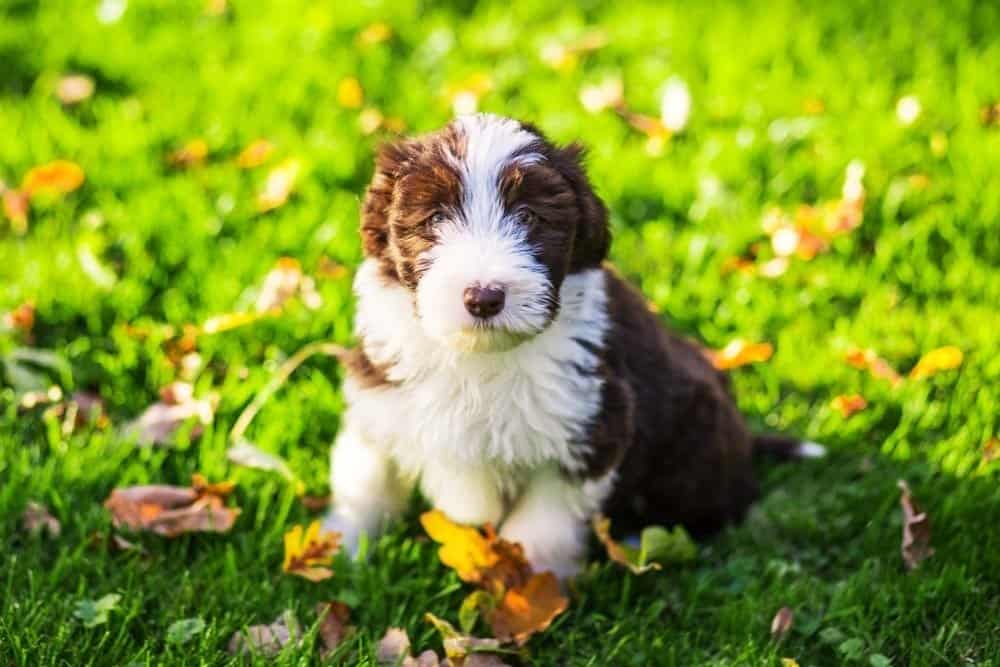
Bearded collie pups need to be fed three or four times a day.
©Clem Hencher-Stevens/Shutterstock.com
Bearded Collie and Children
Bearded collies are very active and are especially playful around children. They are also very fond of warm hugs and enjoy a lot of attention. However, their energy levels could also prove a little harmful around young children.
Dogs Similar to Bearded Collies
Some dogs that are very similar to the bearded collie are:
- Australian Cattle Dog: These dogs are also herding dogs and are medium-sized, much like the bearded collie. They are also intelligent and can efficiently handle cattle herds on their own.
- Border collies: These dogs excel at helping humans in herding sheep and livestock. They are intelligent as well as athletic and participate in a lot of dog sports activities like the bearded collie.
- Australian Shepherd: These dogs are medium-sized and are common in the United States. They are highly intelligent and make great family and herding dogs.
Famous Bearded Collies
Bearded collies have often appeared on screens for their fluffy physique and ability to learn proper training. Some of the characters involve Chiffon, Wilby’s pet in the 2006 Walt Disney classic The Shaggy Dog.
A bearded collie appears in the 2001 film Agent Cody Banks to walk alongside the main character. You can also find one of these dogs in the old television show Please Don’t Eat the Daisies. One of the most famous beardies to ever grace the stage was in the original production of Peter Pan, playing the role of the family dog Nana.
Popular Names for Bearded Collies
Some of the popular names for this sheepdog are:
- Milo
- Buddy
- Sully
- Odie
- Coach
View all 386 animals that start with B
Bearded Collies are Omnivores, meaning they eat both plants and other animals.
Bearded Collies belong to the Kingdom Animalia.
Bearded Collies belong to the class Mammalia.
Bearded Collies belong to the phylum Chordata.
Bearded Collies belong to the family Canidae.
Bearded Collies belong to the order Carnivora.
Bearded Collies belong to the genus Canis.
Bearded Collies are covered in Hair.
The average number of babies a Bearded Collie has is 7.
The scientific name for the Bearded Collie is Canis lupus.
The biggest differences between a Bearded Collie and an Old English Sheepdog lie in their size and appearance.